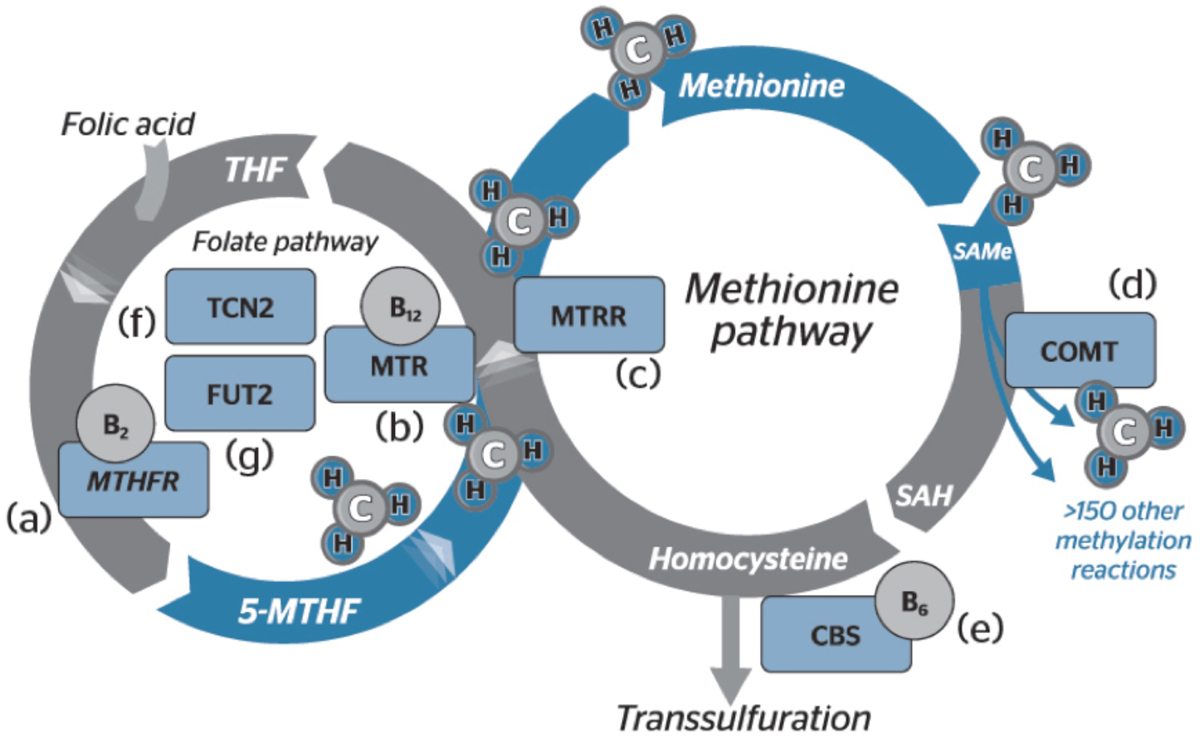Genetic Methylation and Its Importance to Health and Well-Being

Methylation. Sounds intimidating right? Don’t let it be. Methylation is WAY simpler than it sounds, but SUPER IMPORTANT to understand.
You may have heard some of the information that is about to be shared from Gary Brecka of 10X Health. He has been sharing this all over social media but I promise you, we will simplify this and give you actionable steps that can transform your life.
Methylation is a biochemical process that involves the addition of a methyl group (CH3) to a molecule. Methyl groups are the biochemical on-and-off switches for gene expression. They control enzymatic reactions, impact mood, modulates neurotransmitter balance, protects against chronic degenerative disease by reducing the inflammatory processes, transform toxins into forms that are readily excreted, impact tissue healing, and protect cells from oxidative stress.
In layman’s terms, Methylation is the process of breaking down raw nutrients that we ingest into a form the body recognizes and uses.
Let’s use oil and gasoline as an example. When crude oil is pulled out of the ground it cannot be directly used to fuel a car. The crude oil must be refined into gasoline and then it can be used for fueling a vehicle. This is an example of how methylation works. It takes raw materials and breaks it down into a usable form.
Why is Methylation so Important for Health and Well-Being?
Almost everything from proteins, carbohydrates, and fats to minerals, nutrients, and vitamins, have the ability to be converted by the body. If the body can’t convert something due to a genetic mutation, then it’s left with a nutrient deficiency. This deficiency may be a cause to some of the most common health care conditions.
Common conditions that may have dysfunction to the body’s methylation process and/or nutritional deficiencies are:
- Anxiety
- Depression
- ADD/ADHD
- OCD
- Brain Fog
- Thyroid Problems
- High Blood Pressure
- Bad Temper
- Poor Sleep
- Gut Issues
- Weight Gain
The methylation process is essential for everything from detoxification to energy production, hormone balance, and maintaining proper immune and nervous system function. But here’s a kicker, it’s not just one gene that can cause issues. There are actually five genes that can mutate and could cause dysfunction. This may be preventing your body from functioning optimally and depriving itself of the essential nutrients necessary for health and well-being.
The 5 genes for methylation that must be understood and tested are:
- MTHFR
- MTR
- MTRR
- AHCY
- COMT
Methylation is involved in many important processes such as gene expression, DNA and RNA synthesis, immune cell differentiation, neurotransmitter synthesis, histamine clearance, detoxification, hormones, mitochondrial metabolism, phospholipid synthesis and myelination, and neural tube development. It occurs in almost all cells in the body. Each of these 5 genes are extremely important for these processes to properly function.
When these 5 genes work optimally, YOU work optimally.
What many people chalk up as the “aging process” can simply be an improper breakdown nutrients properly.
Lets review each of these genes and understand how a defect may effect the human body.

1. MTHFR:
It is estimated that approximately 44% of the population has a defect to the MTHFR gene.
MTHFR stands for Methylenetetrahydrofolate Reductase. It is an enzyme that is involved in the conversion of folate (a B-vitamin) or folic acid into its active form called Methylfolate. Methylfolate is essential for many biochemical processes, including DNA methylation and the synthesis of important molecules like neurotransmitters. A defect or mutation in the MTHFR gene can lead to reduced activity of the MTHFR enzyme, impacting the folate metabolism pathway.
Simply stated, the MTHFR gene helps the body convert Folate (or Folic Acid) into the usable form called Methylfolate (5-MTHF).
MTHFR gene mutations may cause the following:
Impaired Folate Metabolism:
The MTHFR enzyme is crucial for converting 5,10-methylenetetrahydrofolate to 5-methyltetrahydrofolate, the active form of folate. Reduced enzyme activity may lead to impaired folate metabolism.
Elevated Homocysteine Levels:
Insufficient conversion of 5,10-methylenetetrahydrofolate can result in elevated levels of homocysteine and may be associated with an increased risk of cardiovascular disease.
Impact on Methylation Processes:
DNA methylation is influenced by folate levels. A defect in the MTHFR gene can disrupt normal DNA methylation and impact for gene expression and cellular function.
Neurological and Developmental Effects:
Some studies have suggested a potential link between MTHFR mutations and an increased risk of certain neurological and developmental disorders, such as neural tube defects, autism, and schizophrenia.
MTHFR gene expression is very early in the methylation cycle, so it has a great impact on all other genes in this cycle. This is the worst gene mutation to have but is one of the easiest to supplement and/or correct.
Many people with this genetic mutation are prone to anxiety. Anxiety is a fear of the future, a fear of things that haven’t happened or are likely not going to happen. Usually these people are very pessimistic because they always are thinking of the things that could go wrong and persistently worry about them. Some individuals may also deal with anxiousness. Anxiousness is a fear of the present. These people tend to treat everything as an emergency and think that things must happen right away. They tend to be on time and hate when people are late. Others with this defect may also suffer from depression and can be prone to panic attacks and suicidal thoughts. Women with this gene mutation tend to have infertility issues and recurrent miscarriages.
2. MTR:
The MTR gene, also known as 5-methyltetrahydrofolate-homocysteine methyltransferase, provides instructions for making an enzyme called methionine synthase, which plays a role in processing amino acids, the building blocks of proteins. Methionine synthase converts homocysteine to methionine using methylated vitamin B12. Inflammation and elevated homocysteine levels can
increase the risk of cardiovascular disease.
A person with MTR gene mutations can also cause gas, bloating, diarrhea and/or constipation. They are typically reaching for antacids for relief, may also think they have food allergies, although the primary cause to this is poor gut motility.
3. MTRR
The MTRR gene, also known as 5-methyltetrahydrofolate-homocysteine methyltransferase reductase, codes for the enzyme methionine synthase reductase. This enzyme plays a crucial role in the regulation and activation of methionine synthase, as well as the recycling of vitamin B12 (cobalamin). B12 is an important cofactor for methionine synthase. Variants can be involved with the
development of cancers, Parkinson’s disease, depression, or hypertension.
Many with this mutation may experience heartburn or acid reflux and are typically using antacids with minimal long lasting relief. They tend to have many food intolerances or thyroid issues, due to poor methylation and conversion of the inactive T4 hormone into the active T3 hormone. Short tempers may be common. They may be very hard to calm down once upset or angry. Many times, the argument or “punishment” doesn’t fit the crime.
4. AHCY
The AHCY gene, also known as S-adenosylhomocysteine hydrolase, encodes an enzyme called adenosylhomocysteine. This enzyme plays a crucial role in the methionine cycle and helps breakdown S-adenosylhomocysteine (SAH), a byproduct of various methylation reactions in the cell.
This genetic mutation is very rare but may include people with addictive tendencies. For example, a child addicted to video games; a teenager addicted to a phone; or an adult addicted to drugs, alcohol, sugar, working out, or working.
5. COMT
The COMT gene encodes for an enzyme called Catechol-O-Methyltransferase. By metabolizing stress hormones and neutrotransmitters, the COMT gene is directly responsible for bringing your
heartbeat down to normal levels and restoring a sense of balance both to your physiological and your psychological self. This enzyme is involved in the breakdown and inactivation of dopamine, epinephrine, and norepinephrine. This may lead to conditions such as ADD/ADHD, OCD, racing thoughts, poor sleep habits and very short tempers. This genetic break may also include symptoms like hypertension and hormone or neurotransmitter dysregulation.
These individuals may be prone to feeling internal chaos and disorganization in their mind, thus creating a need for organization in their external environment. They may have extremely organized closets or drawers and may favor color coordination or alphabetically organized processes or systems. They may be perfectionists, very hard on themselves and be your typical overachiever or have a type-A personality.
Many of these individuals are extremely successful, due to the fact that they push themselves. They might be entrepreneurs or executives because they don’t do well with others telling them what or how to do something. They tend to focus on many things at the same time and have a hard time paying attention, may procrastinate because there are “too many things to do” and they want everything done perfectly.
Conclusion:
As you can see, the methylation process is extremely important for optimal health and function. Having a genetic mutation to any or all of these genes may have detrimental effects to overall health. The greatest thing is that the fix is simple; using proper nutrients and/or supplements to counter the inability to breakdown raw materials into the recognizable, usable form.
For example, MTHFR gene mutations may cause an impaired ability to convert folate or folic acid to methylfolate (5-MTHF). A deficiency in methylfolate could be a cause to many health care conditions. It would be highly recommended to supplement with a methylated multivitamin or b-complex.
How do you know your multivitamin or b-complex is methylated? Check the nutritional label. Instead of Folate being in the form of “folate”, it should be say methylfolate or 5-MTHF.
Understanding the body’s methylation process is extremely important for optimal health and well-being. Here’s some good news, there are genetic tests available to evaluate these 5 genes.
Who may benefit from this test? Individuals experiencing the following diagnoses or symptoms:
- Fatigue
- Depression, anxiety, pain attacks, insomnia, mood swings
- Cardiovascular disease
- Cancer
- Musculoskeletal Disorders
- Weight Difficulties, metabolic syndromes, diabetes
- Signs of poor detoxification.
We are very excited to provide this at The Chiropractic Source in Cedar Grove NJ. Please contact our office if you would like to learn more about genetic methylation testing.
The Chiropractic Source
388 Pompton Avenue
Cedar Grove, New Jersey 07009
Office: 973-228-0500
| Monday | 9 AM - 1 PM 3 PM - 7 PM |
| Tuesday | 3 PM - 6 PM |
| Wednesday | 9 AM - 1 PM 3 PM - 7 PM |
| Thursday | 9 AM - 1 PM 3 PM - 7 PM |
| Friday | Closed |
| Saturday | Closed |
| Sunday | Closed |

